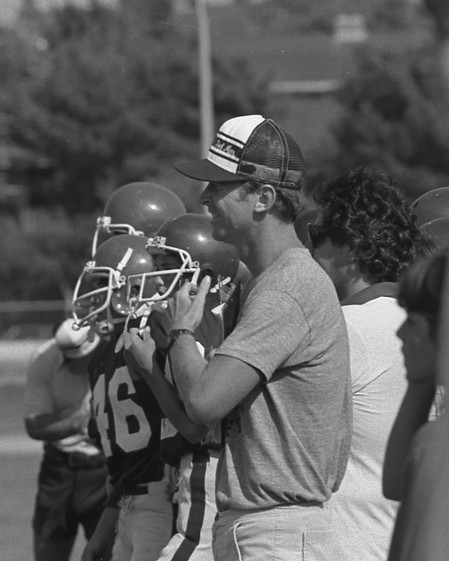South Pasadena High School
Alumni Association - 1907-2025
*Tiger Talk Forums
| Forum: Stories About Life Experiences-NOT school related | |||||
|
|||||
|
James Tomlin
Class Of '61
 Posts: 37 View Profile |
Coaching Soph Football Posted Monday, March 8, 2010 10:26 AM
Coaching Sophomore Football It will probably come as a surprise to some people that I coached high school football. Although I played football in high school, I was certainly not a star. It’s been my experience that people who are really good at something are often not as good at teaching the skills that may have come easily to them. They haven’t really thought about why they were good. In any case, there were three reasons why I wanted to coach football. In the first place, football is the premier sport in any high school, a huge part of the foundation of the students’ pride in their school. The football season is in the fall, when school begins, and nearly every freshman wants to play. This is where the strongest, fastest and most competitive athletes can be found. As the head track coach, these were the athletes I wanted to attract into my program. In the second place, I badly needed a strength and conditioning coach on my track staff and the best man for that position was my friend Bill Cool, one of the finest high school coaches I’ve ever worked with. His record over thirteen years of coaching football was something like 117-10, and he won nine conference championships with six undefeated teams during that time span. Bill agreed to coach track if I would coach football. It was a no brainer of a tradeoff, and he was a major reason for our track success for the next nine years, helping us to win nine conference championships. In the third place, I wanted to coach football. The game has so many aspects and strategies. At the sophomore level, the players have already been instructed in the techniques of blocking and tackling, and there are drills appropriate to keeping those skills maintained. As for throwing, catching and running, the kids have been doing these skills since they first walked. It’s the strategies of plays and matchups that make the game so fascinating. At the first parent meeting, Bill introduced me and lauded my skills and record as the head track coach. Our record at that time was 21-5 and we had just won the first of the nine championships that we would win during my time as head coach. As he wound up the meeting, Bill told the parents that their student athletes were the most talented he had ever had. He would repeat this over the course of the three years that I coached football with him. He then added, “And if we don’t win every game this season we will have done a poor job as coaches.” Great. The fact is, we did win every game for three years until my last year when the varsity coach took our three best players with two games remaining in the season. The varsity needed them, and I used the same philosophy in track. Any sophomore who could help our varsity win was on the varsity. Our record over eleven years was 99-7-2. Nevertheless, it was hard to lose those kids and that last year we lost the final two games which brought our three year record to 25-2. In my second year, we made it to the last game undefeated. It had been an enjoyable year. We had great kids who were very good players and the coaches, mostly Bill, had outplayed and outwitted schools with much larger enrollments. My contribution was mostly to the offense, where I had created several variations of the base plays that the varsity asked us to teach. These were not exactly trick plays, but were deceptive variations. The varsity coaches were actually upset with us for running the plays, which they contended wouldn’t work in varsity football. I did notice that they ran two of my creations in the last game and they were quite successful. In the last game of the season we were playing We drove the ball to the During the game there had been a couple of loud mouthed parents who despite the fact that they had never been at our practices to see what our players could, and couldn’t do on the football field, had strong opinions about the game and our decisions. They had made disparaging remarks all year about our coaching abilities and play calling skills. To their credit, their sons were both angry and embarrassed about their fathers’ loud and obnoxious behavior, and never lost confidence in the coaches. Sheila was in the stands, sitting far too near to the insufferable duo. It’s hard to see how my wife Sheila fell for an athlete and a coach. We joke that when we met she thought that the Rose Bowl was to put the flowers in for the coffee table. Even so, during the time I was coaching she attended most of our games and meets. Her attendance diminished only slightly when we had young children. Once they could walk, she brought them to the games, but it was an act of true love, because Sheila does not enjoy watching sports. Over the years, she was our timer, photographer, long jump official and general cheerleader. Sheila is generally non confrontational. She deftly deals with the inevitable but sometimes intentional glitches that merchants, neighbors and insurance companies confound us with in the course of daily life. Later, when she became a teacher, she dealt with parents, colleagues and administrators with the same skillful aplomb, but the one man in particular was testing both her patience and good nature.
When I called time out to discuss our options, the parent in the stands let loose with another assault on the intelligence, character and judgment of the sophomore coaching staff. With the words, Will you give it a rest already on Sheila’s tongue and a deep breath taken to fairly launch them into the air, the woman sitting next to the main offender said loudly, “Rob, will you shut up. You coached them in pee wee and you lost every game.” An old song by the Four Seasons comes to mind, Silence is Golden. Because of the halt in action on the field while the coaches discussed our next move, the words fairly echoed throughout the bleachers. We never heard about the consequences of her much appreciated observation. I did convince the other coaches to punt the ball. The short kick took a favorable bounce and rolled to the “Did you guys hear that person in the stands?” “No, but we heard his wife,” Bill said with a laugh. |
||||
|
|||||
